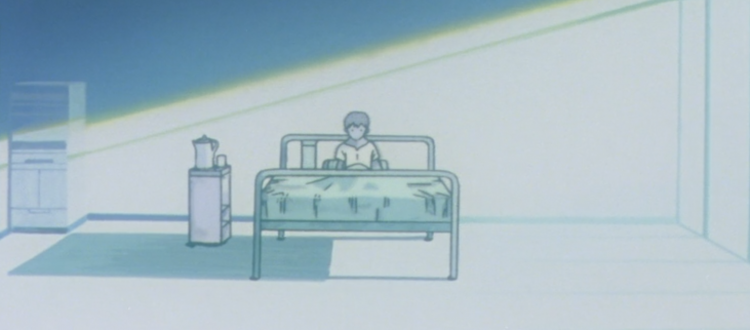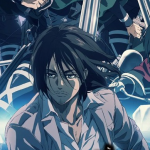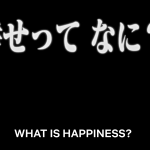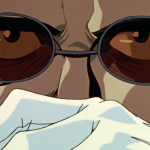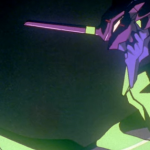Revangelion: Part 2 – The Cruel Beast
There’s a resonance to the characters as we see them in the second episode of Evangelion. If we put a very large bracket – one inked in red pen with a note in the margin that says, see me after class – around the tight shots on Misato’s cleavage and Daisy Duke shorts, it’s likely that the entire purpose of this episode is to provide the audience with a pathway to empathizing with Shinji and Misato. Cultivating said empathy was work that I never wanted to do in the past, because it meant admitting certain things to myself about myself.
My younger self was raised on a diet of being told to shut-up, man-up, and do the thing. Through the lens of anime, I saw myself akin to the likes of Max Sterling from Robotech/Macross. He never hesitated to go into battle. He never refused to fight, even when the traumas of battle were obvious to everyone but himself. The story demanded Max be the best humanity had to offer; the world expected nothing less from me. I hated Shinji for his whining and hesitation.
Where Angel Attack introduced Shinji and Misato as two-dimensional figures, The Beast adds depth through diving headlong into their internal conflict. Shinji is a lonely insomniac. He doesn’t understand his place in his shared apartment with Misato, let alone the world. Misato runs parallel as the grown-up version of Shinji. The difference between the two is that Misato has cultivated just enough competence to pass as a skilled professional at work. The episode readily demonstrates that she has nothing left in the tank once that façade has played itself out for the day.
It used to be so much easier to bag on this episode before I understood that feeling.
However, there are still valid questions that one can raise about this episode. What’s the audience to do with the cross shaped explosions other than nod and note the “Christianity for the sake of Christianity” on their Evangelion Obscura Bingo Card?
I’ve already mentioned that the episode evokes a certain cringe. Is it fair to take that cringe and, with all the flourish of Phoenix Wright, declare an objection that detracts from all other emotional beats? Perhaps, but I know I’ve gone down that road in the past as a way to skate around making a personal connection to the story.
Banging on about how the camera leers at Misato to the detriment of all other observations means ignoring that, from the outset, Shinji knows his only value is found in his capacity to pilot the Eva. To Ritsuko, Shinji is the organic component of a weapons system. To Gendo, he’s a cog in the Human Instrumentality Project. The episode is emphatic on this point. We see Gendo, Ritsuko, and even Misato talking about Shinji as an object. This language is reinforced with establishing shots that show Shinji isolated for large swaths of the episode. The most notable example is when he wakes up in the hospital and is entirely alone. Presumably, NERV didn’t see fit to waste resources on emotional comfort. Though that is not surprising from a series where I once observed that a single therapist on staff at NERV would undermine the entire conflict of the series (which is also why I submit there is a fundamental stupidity to Evangelion as an attempt at telling a long-arc conflict).
Amid these invitations to introspect, the episode does manage to recap Shinji’s battle with Sachiel. To wit, Shinji gets his ass kicked during his first outing as a pilot. Only with the Eva slipping into a berserker rage, which, in turn, reveals the Eva as a semi-sentient organic lifeform, does the battle resolve with the angel self-destructing around Eva-01.
A deep reading on the juxtaposition of rage and self-annihilation might lead someone to see this battle as a commentary on the inherent futility of rage within the spectrum of human motivation. Rage gets a person off the couch, but it’s not something that amounts to a sustainable way of living. Alternatively, this feels like I might be projecting too much of myself on to the show. Then again, the general absence of meaningful plot in this episode invites that sort of projection. So far, we have seen a story featuring long silences, oblique dialogue, and a tendency to send the ball back to the audience. Nobody seems to know what is going on, save for the guy who might be a Bond villain. Add while the writing is asking for our indulgence at being grand and mysterious, it also wants to throw feelings of severe alienation and depression into the mix. This is a big ask after only two episodes.
[A note from a version of me who has finished watching the entirety of the series, for a third and final time, and is now free to connect the dots that past-Adam could not quite see:
This episode captures part of the challenge inherent to writing about Evangelion. These first few episodes really invited some emotional introspection on my part. Yet it is not going to take very long for the repeated story beats of battle/trauma/galaxy brain visual metaphors to wear out their novelty. I will come to see this series as a low stakes emotional menagerie: therein, episodes feel more like stand alone exhibits than something that will offer meaningful continuity. Evangelion offers traumatized people as features within a zoo, and only in the 11th hour does it attempt to slam some emotional growth into its misery porn. Let the record show that in the above composed words, I was really trying to connect with the vulnerability at the core of these characters. Before long I will get sick of being Evangelion being less than the sum of its parts.]

